More than any other individual in modern Chinese history, Mao Zedong is widely regarded as one of the leaders who made that country into the Communist superpower that it is today.
Now the Chinese Communist Party has officially declared that its current president, Xi Jinping, is on par with the much-revered leader.
On Tuesday, the Chinese Communist Party, which is in the middle of its 19th Party Congress (held once every five years), voted that the "Xi Jinping Thought on Socialism with Chinese Characteristics in a New Era" should be enshrined in the party constitution, according to The New York Times. This means that his school of thought will become compulsory learning for Chinese children, from grade school through university programs, along with the works of previous Chinese leaders Mao Zedong and Deng Xiaoping.
But what does "Xi Jinping Thought" actually entail?
For one thing, it holds that the commencement of Xi Jinping's presidency began a new "third era" in modern Chinese history, according to The New York Times. Xi Jinping has argued in the past that the two previous eras included the period from the Chinese Revolution in 1949 to the death of Mao Zedong in 1976 and rise of Deng Xiaoping in 1978, and then from Deng Xiaoping's rise in 1978 until Xi Jinping's own ascent to power.
According to Xi Jinping's doctrine, the new era in modern Chinese history is one that should focus on rebuilding the nation's military and thereby strengthen the country's standing as an international superpower.
The elevation of Xi Jinping's ideas also puts him in a different league from his two predecessors, Jiang Zemin and Hu Jintao. While their ideas have been incorporated into Chinese Communist doctrines, they have not had their ideas elevated to a level on par with Mao Zedong and Deng Xiaoping.
One reason Xi Jinping has been able to pull off this remarkable rise in power is that, after becoming president in 2012, he launched a massive anti-corruption campaign in the party and military that effectively demonstrated his rule over both institutions.
This latest decision by the Communist Party only further cements the notion of Xi Jinping as a different kind of leader than the country has seen since Deng Xiaoping.
"Xi Jinping now has an institutional guarantee of support. He can be emperor for life — staying in power as long as his health allows," Professor Willy Lam of the Chinese University of Hong Kong's Center for China Studies told CNN.



Shares